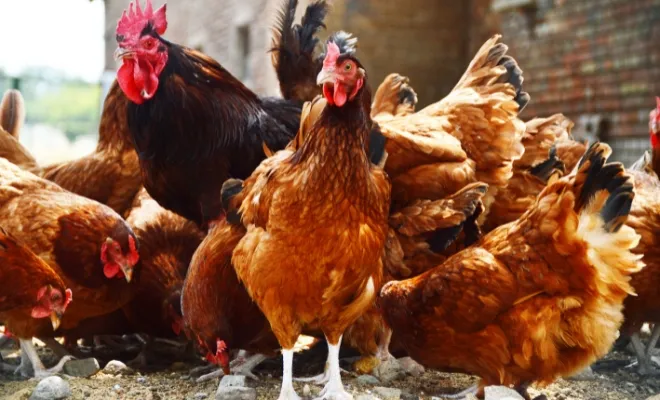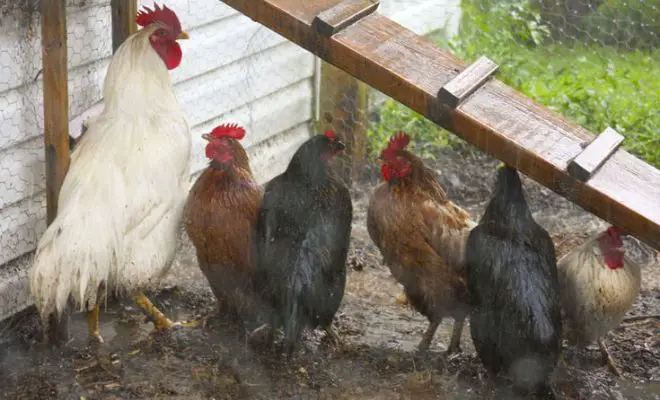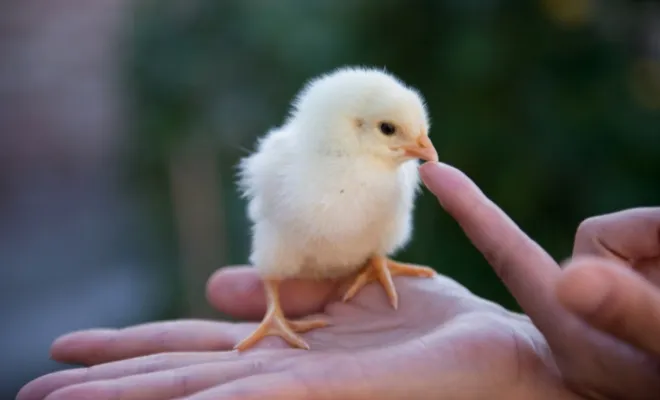Why Are My Chickens So Noisy? Decoding the Feathered Chatter!

Why are my Chickens so noisy? Chickens make noise for different reasons. First, make sure they always have water and food. If they’re loud, they might be worried about predators, so check for dangers. Sometimes, laying eggs or wanting to sit on them makes them noisy. Moreover, if they’re bored or stressed because of not enough space or things to do, they might get louder.
Look for signs of sickness or injury, and sudden changes in their home could also make them noisy. They talk more during social times or when figuring out who’s in charge.
Table of Contents
Why Are My Chickens So Noisy? Considering 6 Factors!

Chickens make noise because of how they naturally act, the place they live in, and whether they are healthy or not. It’s a mix of their instincts, their surroundings, and how they feel overall. Here’s a breakdown of how each of these factors contributes to chicken noise:
1. Communication Within the Flock
Chickens really like hanging out together and talking in their own special way. They use clucks, crowing, and other sounds to keep the group together. Chickens make different sounds to talk to their friends.
They might tell them about finding food, say they’re happy, or warn about possible dangers. It’s important to learn these sounds to understand what the chickens are saying to each other.
2. Warning Signals for Predators
Chickens are really good at sensing danger. They use different sounds to tell their friends about possible threats. When they make specific alarm calls, it helps the group know what kind of danger there is. And they can find a safe place or get ready to protect themselves.
This natural way of talking about predators helps chickens stay safe in the wild and even when they live with people. We need to understand and respond to these warnings to keep the chickens safe and happy.
3. Environmental Factors
Chickens are like little detectives and notice when things change around them, especially if there are new people or animals. They’re careful because it helps them stay safe.
When they get noisy around strangers, it’s like they’re saying they feel uneasy and want to be more alert. Making the place calm and familiar can help them get used to things slowly and feel better over time.
4. Changes in Weather Conditions

Chickens feel the weather changes, and when it’s not so nice, they might get louder. Rain, storms, or really hot or cold days can make them stressed and noisy. But if we give them good shelter, and comfy bedding, and make some changes in their home.
It can help them feel better and keep the noise down. This way, the chickens can be happier and more peaceful.
5. Pain or Discomfort
Chickens might make different sounds if they’re feeling hurt or uncomfortable. If they have problems like injuries, infections, or not getting the right food, it can change how they act and talk.
To help them, it’s important to check their health regularly, feed them well, and take them to the vet if needed. This way, we can fix any health problems and make sure they’re happy without making extra noise.
6. Reproductive Behaviors
When chickens have babies or lay eggs, they may make more noise. Roosters, especially, talk a lot during the time they’re trying to find a mate. Knowing about these natural behaviors can help us tell if the noise is normal or if something might be wrong.
Make sure they have good places to lay eggs. And thinking about how the chicken group gets along can make sure everything is calm and happy during baby-making times.
How Do Breed-Specific Traits Affect Chicken Noise? Differences in Noise Levels

Figuring out why some chicken types make more noise than others is like piecing together a puzzle. It’s about thinking about the sounds they naturally make and how their genes influence the way they talk.
Chickens make different sounds, and it depends on their breed. Some are louder than others because of their unique behaviors and characteristics.
| Breed | Rooster Noise Level | Hen Noise Level |
|---|---|---|
| Rhode Island Red | Moderate to Loud | Moderate |
| Leghorn | Loud | Moderate |
| Sussex | Moderate to Loud | Moderate |
| Plymouth Rock | Moderate | Moderate |
| Wyandotte | Moderate | Moderate |
| Brahma | Moderate | Low to Moderate |
| Australorp | Moderate to Loud | Moderate |
| Orpington | Moderate | Low to Moderate |
| Silkie | Low to Moderate | Low |
| Bantam | Low to Moderate | Low |
Genetic Influences on Vocalization in Chicken

Chickens make sounds because of their genes. The mix of clucks and melodies they produce tells us about the genetic influences on how they vocalize.
How Breeding Affects Talking
The way people choose which chickens to breed has a big impact on how much they talk. Breeders often focus on specific traits, and talking can be chosen or not chosen depending on what the breeder wants.
This means some breeds might have a natural tendency to be more talkative, while others are quieter.
Where Talking Comes From
The talking habits of chicken breeds can also be traced back to their history. Chickens’ wild ancestors used vocal communication to survive. And these habits still exist to some extent in different breeds.
Learning about a breed’s history can help us understand how much they talk naturally.
Adapting to Behavior
The natural tendency to talk is connected to behaviors that helped the breed survive in the past. Understanding these behaviors can help chicken keepers appreciate their flock’s natural instincts.
For example, breeds that were used to roaming freely may be better at communication than those bred to live in smaller spaces.
How Loud Are Chickens? Let’s Understand the Sounds!

Chickens make various sounds, and the loudness of these sounds can vary. Generally, chickens are not extremely loud compared to some other animals, but they can be noisy, especially when they are disturbed, excited, or laying eggs.
The most common sounds made by chickens include:
- Clucking: Hens often make clucking sounds. Which can be relatively soft and gentle.
- Cackling: Hens may cackle loudly after laying an egg. This can be one of the louder sounds they make.
- Rooster Crow: Roosters are known for their crowing, which can be quite loud. The volume and frequency of crowing can vary between individual roosters.
- Squawking: Chickens may squawk when they are alarmed, frightened, or being pursued by a predator. This can be a loud and urgent sound.
See the video to understand more about their noise!
How Does Housing Design Impact Chicken Noise?
When it comes to keeping chickens in your backyard, the way their house is designed can affect how much noise they make. Here are some simple things to think about:
Keep the chicken house far from neighbors’ homes. If it’s too close, the noise might bother them. Make a good chicken house. If the house has too many openings, the chicken sounds can escape. Use special materials to keep the noise inside.
Give the chickens a quiet place to lay eggs. Chickens can be loud when they lay eggs. Make sure their nesting areas are calm and cozy.
Think about how many chickens you want. Having too many can make more noise. Consider your backyard size and what the rules say about how many chickens you can have.
Some places have rules about when it’s okay to make noise. Be aware of these rules and try to keep the chickens quiet during sensitive times.
What Are Effective Strategies for Reducing Chicken Coop Noise?
Noise control in poultry farms is not a difficult task when you know the strategies. Making sure your chicken coop isn’t too noisy is important so you don’t bother your neighbors. One way to do this is by picking chicken types that aren’t too loud, like bantams or Silkies.
Also, make sure there’s enough space for each chicken in the coop, so they don’t feel crowded and make more noise.
You can use special materials to block out some of the sounds, like putting up panels or insulation. Put the coop in a smart spot, away from where people live, or behind trees and bushes.
Having fewer roosters or just hens can help because roosters can be noisier.
Keep the coop clean and comfy, and add things for the chickens to do so they won’t get bored and noisy. You can also play some soft music or use a fan to cover up the chicken sounds. Training your chickens and talking to your neighbors about what you’re doing to keep things quiet are also good ideas.
Why are Chickens So Noisy in the Morning?

Chickens are often loud in the morning because it’s their natural time to be active and talk to each other. They’re like morning birds! In the daytime, chickens like to move around and make noise.
They talk to show they’re ready for the day and to tell other chickens what’s going on. Also, they get hungry after sleeping, so they might be extra loud, especially when they know it’s time to eat.
Chickens have a social order, and mornings are when they figure out who’s in charge. Sometimes, the weather or other animals can make them a bit nervous, and they talk more.
Plus, hens usually lay eggs in the morning, and that can make them chirp too. It’s normal for chickens to be noisy in the morning, but if they’re too loud, it might mean something is bothering them.
Recommended Articles:
- Can Chickens Fly
- Why Do Chickens Sneeze
- Different Facts of Sleeping Chicken!
- 7 Reasons Why Chicks Chirp So Much
FAQs
Check out the related queries I included!
Q. Are noisy chickens happy?
No, excessive noise in chickens can indicate stress or discomfort.
Q. Why is my chicken screaming at night?
Nighttime screaming in chickens may signal distress, discomfort, or a reaction to predators.
Final Words
In summary, chickens make noise because of how they naturally act, where they live, and if they’re healthy. They talk to each other using different sounds for different things like finding food or warning about danger. Environmental changes, like bad weather, can make them stressed and noisy.
If they’re hurt or uncomfortable, they might make different sounds. Some chicken types are naturally noisier than others, and how people choose to breed them also affects their talking habits. The design of their house can impact noise too.






